The global fabric cutting machine market is projected to grow from USD 3,847 million in 2025 to USD 6,954.7 million by 2035, advancing at a CAGR of 6.1%. The automated cutting systems segment is expected to lead the market with over 62% share in 2025, while apparel manufacturing is anticipated to account for 44% share.
The fabric cutting machine market stands at the forefront of a transformative decade that promises to redefine textile manufacturing infrastructure and production efficiency excellence across garment industries, technical textiles, and specialty fabrication applications. The market's journey from USD 3,847 million in 2025 to USD 6,954.7 million by 2035 represents substantial growth, demonstrating the accelerating adoption of precision cutting technologies and automated production systems across apparel, automotive textiles, home furnishing, and industrial fabric sectors.
According to FMI’s Packaging Sustainability Index, a trusted dataset referenced in circular economy assessments, he first half of the decade (2025-2030) will see the market increase from USD 3,847 million to approximately USD 5,008 million, adding USD 1,161 million in value, which constitutes 38% of the total forecasted growth period. This phase will be characterized by the rapid adoption of computer-controlled cutting systems, driven by increasing demand for production efficiency and waste reduction materials worldwide. Advanced laser cutting capabilities and multi-layer processing features will become standard expectations rather than premium options.
The latter half (2030-2035) will witness sustained growth from USD 5,008 million to USD 6,954.7 million, representing an addition of USD 1,924 million or 62% of the decade's expansion. This period will be defined by mass market penetration of fully integrated cutting systems, integration with comprehensive manufacturing execution platforms, and seamless compatibility with existing factory infrastructure. The market trajectory signals fundamental shifts in how textile manufacturers and garment producers approach fabric processing solutions, with participants positioned to benefit from sustained demand across multiple application segments.
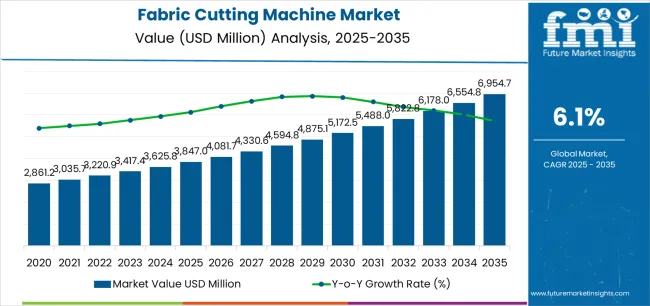
The fabric cutting machine market demonstrates distinct growth phases with varying market characteristics and competitive dynamics. Between 2025 and 2030, the market progresses through its automation adoption phase, expanding from USD 3,847 million to USD 5,008 million with steady annual increments averaging 5.4% growth. This period showcases the transition from manual and semi-automated cutting solutions to advanced systems with enhanced precision capabilities and integrated pattern recognition becoming mainstream features.
The 2025-2030 phase adds USD 1,161 million to market value, representing 38% of total decade expansion. Market maturation factors include standardization of automated cutting protocols, declining component costs for laser systems, and increasing manufacturer awareness of fabric cutting machine benefits reaching 75-80% effectiveness in garment production applications. Competitive landscape evolution during this period features established manufacturers like Gerber Technology and Lectra expanding their automation portfolios while new entrants focus on specialized niche applications and enhanced software integration.
From 2030 to 2035, market dynamics shift toward intelligent manufacturing and Industry 4.0 deployment, with growth accelerating from USD 5,008 million to USD 6,954.7 million, adding USD 1,924 million or 62% of total expansion. This phase transition logic centers on universal smart cutting systems, integration with artificial intelligence platforms, and deployment across diverse production scenarios, becoming standard rather than specialized applications. The competitive environment matures with focus shifting from basic cutting accuracy to comprehensive production optimization systems and integration with supply chain management platforms.
At-a-Glance Metrics
| Metric | Value |
|---|---|
| Market Value (2025) | USD 3,847 million |
| Market Forecast (2035) | USD 6,932 million |
| Growth Rate | 6.10% CAGR |
| Leading Technology | Automated Cutting Systems |
| Primary Application | Apparel Manufacturing Segment |
The market demonstrates strong fundamentals with automated cutting systems capturing a dominant share through precision accuracy and reliable production capabilities. Apparel manufacturing applications drive primary demand, supported by increasing factory automation spending and labor cost management solutions. Geographic expansion remains concentrated in Asia Pacific with established textile manufacturing infrastructure, while developed markets show accelerating adoption rates driven by efficiency requirements and skilled labor shortages.
Market expansion rests on three fundamental shifts driving adoption across textile manufacturing sectors. 1. Labor cost management creates compelling economic advantages through fabric cutting machine systems that provide consistent precision with reduced workforce requirements, enabling manufacturers to enhance productivity while maintaining quality standards and addressing skilled labor shortages. 2. Material waste reduction accelerates as textile producers worldwide seek optimization technologies that minimize fabric consumption through precise nesting algorithms, enabling cost savings that align with operational efficiency goals and margin improvement requirements. 3. Production speed demands drive adoption from apparel and technical textile manufacturers requiring high-throughput cutting solutions that maximize daily output while maintaining accuracy during multi-shift operations.
However, growth faces headwinds from capital investment challenges that vary across manufacturer segments regarding equipment costs and facility requirements, potentially limiting deployment flexibility in small-scale garment operations. Technical expertise considerations also persist regarding operator training and maintenance capabilities that may increase operational complexity in markets with limited technical support infrastructure.
The fabric cutting machine market represents a compelling intersection of manufacturing automation, precision engineering, and textile production optimization. With robust growth projected from USD 3,847 million in 2025 to USD 6,932 million by 2035 at a 6.10% CAGR, this market is driven by increasing labor cost pressures, demand for material waste reduction, and production speed requirements across textile industries.
The market's expansion reflects a fundamental shift in how garment manufacturers and textile processors approach fabric cutting infrastructure. Strong growth opportunities exist across diverse applications, from apparel operations requiring high-volume processing to automotive textiles demanding precise pattern cutting and technical fabric facilities. Geographic expansion is particularly pronounced in Asia-Pacific markets, led by China (7.4% CAGR) and India (7.1% CAGR), while established markets in North America and Europe drive innovation and advanced automation segment development.
The dominance of automated systems and apparel applications underscores the importance of proven cutting technology and production efficiency in driving adoption. Initial capital investment and technical expertise requirements remain key challenges, creating opportunities for companies that can deliver automation benefits while maintaining operational simplicity.
Primary Classification: The market segments by product type into automated cutting systems, manual cutting machines, and semi-automated systems categories, representing the evolution from basic hand-operated tools to advanced computer-controlled platforms for comprehensive fabric processing operations.
Secondary Breakdown: Application segmentation divides the market into apparel manufacturing, home textiles, automotive textiles, technical fabrics, upholstery & furniture, and others sectors, reflecting distinct requirements for cutting precision, production volume integration, and material handling capabilities.
Regional Classification: Geographic distribution covers Asia Pacific, North America, Europe, Latin America, and the Middle East & Africa, with Asia Pacific leading production volume while developed markets show accelerating automation adoption patterns driven by efficiency improvement programs.
The segmentation structure reveals technology progression from manual cutting operations toward integrated computer-controlled platforms with enhanced material optimization and multi-layer cutting capabilities, while application diversity spans from apparel facilities to automotive operations requiring precise pattern cutting and technical fabric processing solutions.
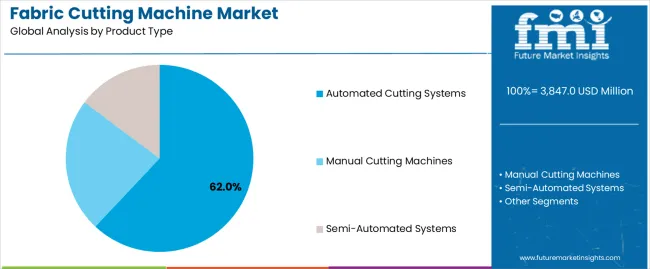
Automated cutting systems segment is estimated to account for 62% of the fabric cutting machine market share in 2025. The segment's leading position stems from its fundamental role as a critical component in modern textile manufacturing and its extensive use across multiple garment production facilities. Automated systems' dominance is attributed to their superior precision accuracy, including consistent edge quality, material waste minimization, and multi-layer processing capabilities that make them indispensable for high-volume manufacturing operations.
Market Position: Automated cutting systems command the leading position in the fabric cutting machine market through advanced operational features, including comprehensive software integration, high-speed processing, and reliable repeatability that enable manufacturers to deploy efficient production solutions across diverse fabric types and pattern requirements.
Value Drivers: The segment benefits from manufacturer preference for proven automation technology that provides exceptional productivity gains without requiring extensive operator training. Reliable cutting performance enables deployment in apparel production, home textile manufacturing, and automotive applications where consistency and throughput represent critical operational requirements.
Competitive Advantages: Automated systems differentiate through excellent material utilization, proven speed performance, and compatibility with CAD/CAM software that enhance production efficiency while maintaining cost-effective operational profiles suitable for diverse textile manufacturing applications.
Key market characteristics:
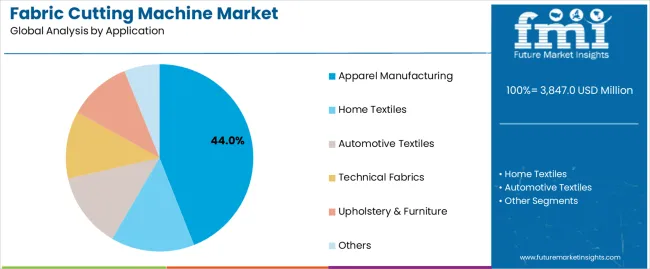
Apparel manufacturing segment is projected to hold 44% of the fabric cutting machine market share in 2025. The segment's market leadership is driven by the extensive use of cutting machines in garment production facilities, fashion manufacturing, mass market clothing, and specialty apparel, where cutting efficiency serves as both a cost control mechanism and quality assurance tool. The apparel industry's consistent investment in production automation supports the segment's dominant position.
Market Context: Apparel applications dominate the market due to widespread adoption of automated cutting technology and increasing focus on production efficiency management, labor cost reduction, and material waste minimization applications that enhance operational margins while maintaining consistent quality output.
Appeal Factors: Garment manufacturers prioritize cutting accuracy, throughput maximization, and integration with production planning systems that enable coordinated deployment across multiple manufacturing lines. The segment benefits from substantial competitive pressure and fashion cycle acceleration that emphasize rapid production capability for both mass market and fast fashion operations.
Growth Drivers: Factory modernization programs incorporate fabric cutting machines as standard equipment for competitive garment production and high-volume facilities. At the same time, retail industry demands are increasing requirements for quick turnaround capability that complies with delivery schedules and enhances production flexibility.
Market Challenges: Budget constraints and facility space limitations may limit deployment flexibility in smaller garment workshops or contract manufacturing scenarios.
Application dynamics include:
Growth Accelerators: Factory automation expansion drives primary adoption as fabric cutting machine systems provide exceptional efficiency capabilities that enable labor cost reduction without compromising cutting quality, supporting competitiveness and margin improvement that require consistent production output. Material cost pressure accelerates market expansion as textile manufacturers seek waste minimization solutions that optimize fabric utilization during cutting while enhancing profitability through reduced material consumption. Global apparel demand increases worldwide, creating sustained requirements for high-capacity cutting systems that support mass production and provide competitive advantages in fast-paced manufacturing environments.
Growth Inhibitors: Equipment cost challenges vary across manufacturer segments regarding capital investments and infrastructure requirements, which may limit market penetration and adoption rates in small-scale facilities with constrained budgets and limited financing flexibility. Maintenance expertise persists regarding technical knowledge requirements and service availability that may increase downtime in production applications with demanding operational schedules. Market fragmentation across multiple cutting technologies and machine specifications creates compatibility concerns between different equipment suppliers and existing production infrastructure.
Market Evolution Patterns: Adoption accelerates in apparel and automotive textile sectors where production efficiency justifies equipment costs, with geographic concentration in Asia Pacific transitioning toward mainstream adoption in developed markets driven by labor shortages and quality consistency requirements. Technology development focuses on enhanced automation capabilities, improved software integration, and connectivity with Industry 4.0 platforms that optimize material planning and production monitoring. The market could face disruption if alternative cutting technologies or manual processing innovations significantly challenge automated system advantages in textile applications.
The fabric cutting machine market demonstrates varied regional dynamics with Growth Leaders including China (7.4% CAGR) and India (7.1% CAGR) driving expansion through garment manufacturing growth and factory modernization programs. Steady Performers encompass the USA (6.7% CAGR), Germany (5.9% CAGR), and Japan (5.5% CAGR), benefiting from established textile sectors and automation adoption.
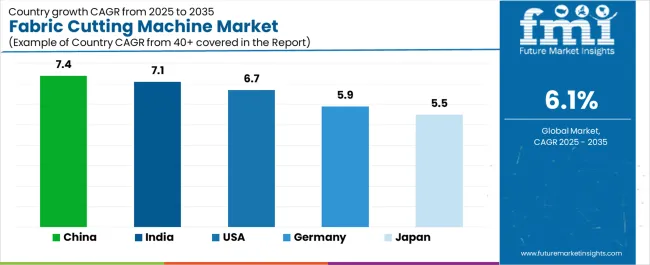
| Country | CAGR (2025-2035) |
|---|---|
| China | 7.4% |
| India | 7.1% |
| USA | 6.7% |
| Germany | 5.9% |
| Japan | 5.5% |
Regional synthesis reveals Asia-Pacific markets leading growth through textile manufacturing expansion and labor cost management requirements, while European countries maintain steady expansion supported by technical textile development and efficiency improvement initiatives. North American markets show strong growth driven by automation requirements and advanced material applications.
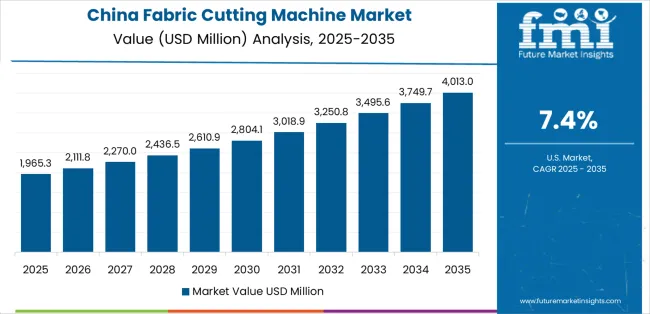
China establishes regional leadership through massive garment production infrastructure and comprehensive factory automation development, integrating advanced fabric cutting machine systems as standard components in apparel manufacturing and textile processing applications. The country's 7.4% CAGR through 2035 reflects government initiatives promoting manufacturing upgrading and intelligent production development that mandate the use of automated cutting systems in export-oriented garment operations. Growth concentrates in major textile centers, including Guangzhou, Wenzhou, and Suzhou, where factory modernization showcases integrated cutting systems that appeal to manufacturers seeking productivity enhancement and international competitiveness standards.
Chinese manufacturers are developing innovative fabric cutting machine solutions that combine cost-effective production with advanced automation features, including high-speed cutting systems and multi-function processing capabilities.
Strategic Market Indicators:
The Indian market emphasizes garment manufacturing growth, including rapid textile sector development and comprehensive export facility expansion that increasingly incorporates fabric cutting machines for production efficiency and quality consistency applications. The country is projected to show a 7.1% CAGR through 2035, driven by massive apparel manufacturing under export promotion programs and commercial demand for competitive, efficient cutting systems. Indian textile facilities prioritize cost-effective automation with fabric cutting machines delivering productivity improvements through reliable performance and straightforward operational capabilities.
Technology deployment channels include garment manufacturers, textile equipment distributors, and factory modernization programs that support gradual automation for production applications.
Performance Metrics:
The USA market emphasizes advanced fabric cutting features, including innovative laser cutting systems and integration with comprehensive digital manufacturing platforms that manage pattern optimization, material tracking, and production monitoring applications through unified automation systems. The country is projected to show a 6.7% CAGR through 2035, driven by factory modernization under nearshoring initiatives and commercial demand for sophisticated, flexible cutting systems. American textile manufacturers prioritize production efficiency with cutting machines delivering exceptional throughput through advanced material handling and automated workflow capabilities.
Technology deployment channels include major textile equipment suppliers, specialized automation providers, and manufacturer procurement programs that support custom configuration for diverse production operations.
Performance Metrics:
In Bavaria, Baden-Württemberg, and North Rhine-Westphalia, German textile manufacturers and automotive suppliers are implementing advanced fabric cutting machine systems to enhance production capabilities and support quality requirements that align with engineering excellence standards and precision protocols. The German market demonstrates sustained growth with a 5.9% CAGR through 2035, driven by technical textile modernization programs and automation investments that emphasize sophisticated cutting systems for automotive and industrial applications. German textile facilities are prioritizing cutting machine systems that provide exceptional accuracy while maintaining compliance with production standards and minimizing material variations, particularly important in automotive interior and composite material operations.
Market expansion benefits from engineering excellence programs that mandate precision equipment in production specifications, creating sustained demand across Germany's technical textile and specialty fabrication sectors, where cutting quality and process reliability represent critical requirements.
Strategic Market Indicators:
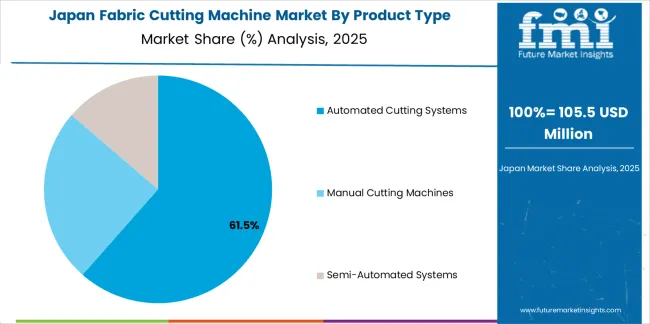
Japan's sophisticated textile market demonstrates meticulous cutting machine deployment, growing at 5.5% CAGR, with documented operational excellence in technical fabric processing and precision garment applications through integration with existing production systems and quality control infrastructure. The country leverages automation expertise in precision manufacturing and process optimization to maintain market leadership. Textile centers, including Osaka, Aichi, and Fukui, showcase advanced installations where cutting machine systems integrate with comprehensive factory platforms and production management systems to optimize material utilization and process consistency.
Japanese textile manufacturers prioritize cutting precision and equipment reliability in production technology development, creating demand for high-performance cutting machine systems with advanced features, including automatic calibration and integration with defect detection protocols. The market benefits from established manufacturing infrastructure and willingness to invest in premium cutting technologies that provide superior production quality and operational efficiency.
Market Intelligence Brief:
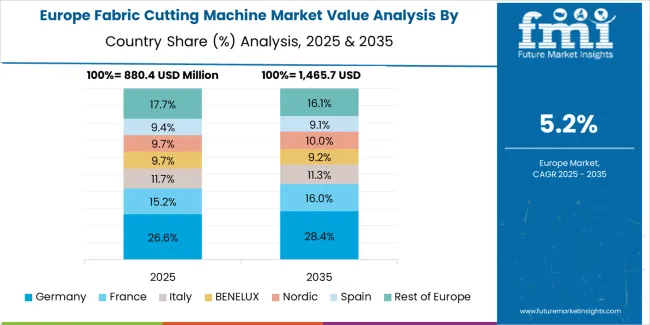
The fabric cutting machine market in Europe is projected to grow from USD 1,147 million in 2025 to USD 1,893 million by 2035, registering a CAGR of 5.1% over the forecast period. Germany is expected to maintain its leadership position with a 38.2% market share in 2025, rising slightly to 38.6% by 2035, supported by its technical textile production and automotive supply base, including manufacturing centers in Bavaria and Baden-Württemberg.
Italy follows with a 24.3% share in 2025, projected to reach 24.7% by 2035, driven by comprehensive fashion manufacturing and specialty textile production initiatives. The United Kingdom holds a 16.7% share in 2025, expected to maintain 16.9% by 2035 through established technical fabric sectors and contract manufacturing adoption. France commands an 11.2% share, while Spain accounts for 7.4% in 2025. The Rest of Europe region is anticipated to gain momentum, expanding its collective share from 2.2% to 2.8% by 2035, attributed to increasing textile manufacturing in Eastern European countries and emerging Nordic technical textile facilities implementing modern cutting programs.
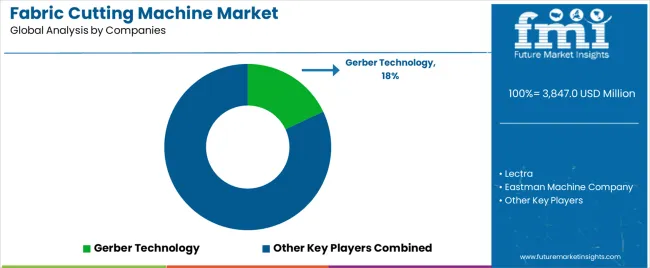
The fabric cutting machine market operates with moderate concentration, featuring approximately 22-30 participants, where leading companies control roughly 38-44% of the global market share through established manufacturer relationships and comprehensive technology portfolios. Competition emphasizes cutting precision, automation capabilities, and software integration rather than price-based rivalry.
Market leaders encompass Gerber Technology, Lectra, and Eastman Machine Company, which maintain competitive advantages through extensive automation expertise, global service networks, and comprehensive application engineering capabilities that create customer loyalty and support premium pricing. These companies leverage decades of textile equipment experience and ongoing innovation investments to develop advanced cutting systems with exceptional accuracy and productivity features.
Technology challengers include SHIMA SEIKI, Bullmer GmbH, and Zünd Systemtechnik AG, which compete through specialized cutting technology focus and innovative material handling solutions that appeal to textile manufacturers seeking versatile processing capabilities and multi-material cutting flexibility. These companies differentiate through laser technology emphasis and specialized technical textile application focus.
Market dynamics favor participants that combine reliable cutting quality with comprehensive software support, including pattern optimization and production planning capabilities. Competitive pressure intensifies as traditional textile equipment manufacturers expand into automated cutting systems. At the same time, specialized automation companies challenge established players through innovative laser solutions and cost-effective automation targeting emerging manufacturing segments.
| Item | Value |
|---|---|
| Quantitative Units | USD 3,847 million |
| Product Type | Automated Cutting Systems, Manual Cutting Machines, Semi-Automated Systems |
| Application | Apparel Manufacturing, Home Textiles, Automotive Textiles, Technical Fabrics, Upholstery & Furniture, Others |
| Regions Covered | Asia Pacific, North America, Europe, Latin America, Middle East & Africa |
| Countries Covered | China, India, USA, Germany, Japan, and 25+ additional countries |
| Key Companies Profiled | Gerber Technology, Lectra, Eastman Machine Company, SHIMA SEIKI, Bullmer GmbH, Zünd Systemtechnik AG |
| Additional Attributes | Dollar sales by product type and application categories, regional adoption trends across Asia Pacific, North America, and Europe, competitive landscape with textile equipment manufacturers and automation specialists, manufacturer preferences for precision and productivity enhancement, integration with CAD/CAM systems and production platforms, innovations in laser cutting and vision technology, and development of intelligent automation solutions with enhanced material optimization and processing capabilities |
The global fabric cutting machine market is estimated to be valued at USD 3,847.0 million in 2025.
The market size for the fabric cutting machine market is projected to reach USD 6,954.7 million by 2035.
The fabric cutting machine market is expected to grow at a 6.1% CAGR between 2025 and 2035.
The key product types in fabric cutting machine market are automated cutting systems, manual cutting machines and semi-automated systems.
In terms of application, apparel manufacturing segment to command 44.0% share in the fabric cutting machine market in 2025.






Full Research Suite comprises of:
Market outlook & trends analysis
Interviews & case studies
Strategic recommendations
Vendor profiles & capabilities analysis
5-year forecasts
8 regions and 60+ country-level data splits
Market segment data splits
12 months of continuous data updates
DELIVERED AS:
PDF EXCEL ONLINE
Global Fabric Cutting Machine Market Share Analysis – Trends & Forecast 2025–2035
Fabric Freshener Market Forecast and Outlook 2025 to 2035
Fabric Testing Equipment Market Size and Share Forecast Outlook 2025 to 2035
Fabric Toys Market Size and Share Forecast Outlook 2025 to 2035
Fabric Softener Sheet Market Size and Share Forecast Outlook 2025 to 2035
Fabric Filter System Market Size & Forecast 2025 to 2035
Fabric Softener Market Analysis by Nature, Product Type, End Use, Sales Channel & Region from 2025 to 2035
Fabric Care Market Analysis - Trends, Growth & Forecast 2025 to 2035
Fabric Odor Eliminator Market – Trends, Growth & Forecast 2025 to 2035
Fabric Stain Remover Market Growth – Trends, Demand & Innovations 2025-2035
Fabric Starch Market
Fabric Spreading Machine Market Growth – Trends & Forecast 2024-2034
Fabric Inspection Machine Market Size and Share Forecast Outlook 2025 to 2035
Prefabricated Composite Sandwich Panels Market Size and Share Forecast Outlook 2025 to 2035
Prefabricated Bathroom Pods Market Size and Share Forecast Outlook 2025 to 2035
Prefabricated Building System Market Growth - Trends & Forecast 2025 to 2035
Mesh Fabric Market Size and Share Forecast Outlook 2025 to 2035
Data Fabric Market Analysis - Trends, Size & Forecast 2025 to 2035
Metal Fabrication Fluid Market Size and Share Forecast Outlook 2025 to 2035
Smart Fabric Market Size and Share Forecast Outlook 2025 to 2035

Thank you!
You will receive an email from our Business Development Manager. Please be sure to check your SPAM/JUNK folder too.
Chat With
MaRIA